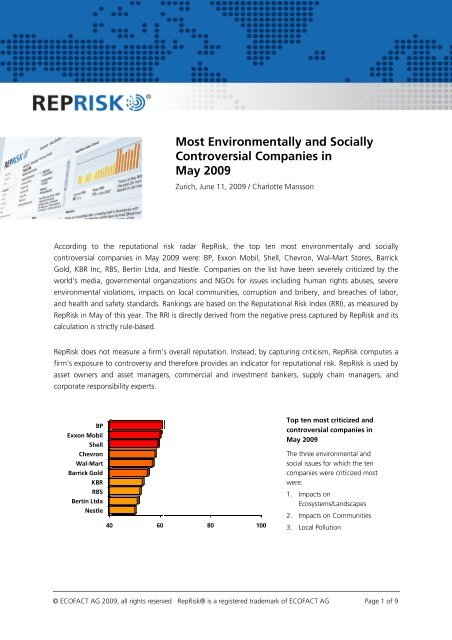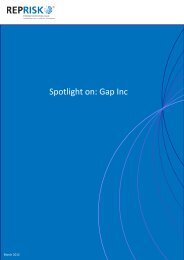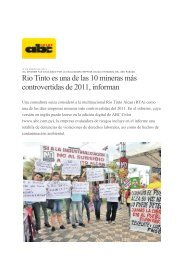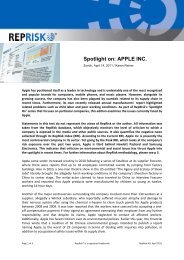Download report - RepRisk
Download report - RepRisk
Download report - RepRisk
Create successful ePaper yourself
Turn your PDF publications into a flip-book with our unique Google optimized e-Paper software.
Most Environmentally and Socially<br />
Controversial Companies in<br />
May 2009<br />
Zurich, June 11, 2009 / Charlotte Mansson<br />
According to the reputational risk radar <strong>RepRisk</strong>, the top ten most environmentally and socially<br />
controversial companies in May 2009 were: BP, Exxon Mobil, Shell, Chevron, Wal-Mart Stores, Barrick<br />
Gold, KBR Inc, RBS, Bertin Ltda, and Nestle. Companies on the list have been severely criticized by the<br />
world’s media, governmental organizations and NGOs for issues including human rights abuses, severe<br />
environmental violations, impacts on local communities, corruption and bribery, and breaches of labor,<br />
and health and safety standards. Rankings are based on the Reputational Risk Index (RRI), as measured by<br />
<strong>RepRisk</strong> in May of this year. The RRI is directly derived from the negative press captured by <strong>RepRisk</strong> and its<br />
calculation is strictly rule-based.<br />
<strong>RepRisk</strong> does not measure a firm's overall reputation. Instead, by capturing criticism, <strong>RepRisk</strong> computes a<br />
firm's exposure to controversy and therefore provides an indicator for reputational risk. <strong>RepRisk</strong> is used by<br />
asset owners and asset managers, commercial and investment bankers, supply chain managers, and<br />
corporate responsibility experts.<br />
BP<br />
Exxon Mobil<br />
Shell<br />
Chevron<br />
Wal-Mart<br />
Barrick Gold<br />
KBR<br />
RBS<br />
Bertin Ltda<br />
Nestle<br />
40 60<br />
80 100<br />
Top ten most criticized and<br />
controversial companies in<br />
May 2009<br />
The three environmental and<br />
social issues for which the ten<br />
companies were criticized most<br />
were:<br />
1. Impacts on<br />
Ecosystems/Landscapes<br />
2. Impacts on Communities<br />
3. Local Pollution<br />
© ECOFACT AG 2009, all rights reserved <strong>RepRisk</strong>® is a registered trademark of ECOFACT AG Page 1 of 9
The RRI ranges from zero (lowest) to 100 (highest) and its calculation is based on the reach of news<br />
sources, the frequency and timing of news, as well as its content, i.e. severity and novelty of the issues<br />
addressed. The RRI is an indicator of a company's exposure to controversial issues and allows an initial<br />
assessment of risks which are attached to investments and business relationships. It also allows the<br />
exposure of an entity to be compared with that of its peers and permits risk trends to be tracked over<br />
time.<br />
The following pages provide a summary of the criticism to which the ten most controversial companies<br />
have been exposed, as well as the environmental and social issues that have been associated with these<br />
companies. The company’s ranking from the previous month is shown in brackets.<br />
In addition to the regular top ten list, this month’s focus area will be on the Mining industry and its top<br />
five most environmentally and socially controversial companies.<br />
Please refer to page 9 for more details on methodology.<br />
© ECOFACT AG 2009, all rights reserved <strong>RepRisk</strong>® is a registered trademark of ECOFACT AG Page 2 of 9
BP Plc, Rank 1 [8]<br />
A large majority of shareholders from BP PLC have voted against the 2008 pay packages put forward at<br />
the annual meeting, claiming they are excessive. WWF criticized BP, Exxon and Rosneft for refusing to<br />
join an advisory panel formed by the International Union for the Conservation of Nature in response to<br />
the potential impacts of oil and gas development on Gray Whale populations in Russian waters. BP came<br />
under fire as it proposed to expand its Whiting Refinery in Michigan, which has been releasing<br />
dangerous levels of cancer-causing benzene for the past six years. The US Environmental Protection<br />
Agency (EPA) has cited BP America for breaches of the Clean Air Act at the Whiting refinery.<br />
Top three issues:<br />
1. Impact on Ecosystems/Landscapes<br />
2. Local Pollution<br />
3. Impacts on Communities<br />
Exxon Mobil, Rank 2 [12]<br />
Exxon Mobil Corp was sued over charges that it has allegedly let millions of liters of crude oil seep into<br />
the earth below Brooklyn, New York, since 1947 and did not do enough to mitigate the situation. A<br />
separate lawsuit filed by the Louisiana Environmental Action Network (LEAN) alleges that over the past<br />
12 months Exxon Mobil's Baton Rouge chemical plant has, on at least 66 occasions, released pollution in<br />
excess of its air permit. In another incident, a US District Court Judge has ordered Exxon Mobil Pipeline, a<br />
subsidiary of Exxon Mobil, to pay USD 6.1 million in fines for violating the Clean Water Act in relation to<br />
an incident at its Everett, Massachusetts oil terminal. Fifteen thousand gallons of low-sulfur diesel and<br />
kerosene spilled into the Mystic and Island End rivers. ExxonMobil has also come under fire for exploiting<br />
Canadian tar sands using a highly polluting and carbon intensive process, which destroys boreal forests<br />
and accelerates climate change. It has been named the worst oil company on Green America’s<br />
Responsible Shopper Website.<br />
Top three issues:<br />
1. Impacts on Ecosystems/Landscapes<br />
2. Local Pollution<br />
3. Impacts on Communities<br />
© ECOFACT AG 2009, all rights reserved <strong>RepRisk</strong>® is a registered trademark of ECOFACT AG Page 3 of 9
Royal Dutch Shell, Rank 3 [4]<br />
Shareholders and environmentalists from the ShellGuilty campaign voiced their anger about Royal Dutch<br />
Shell's track record of alleged polluting, human rights violations and, recently, excessive executive pay<br />
despite the company's failure to meet pre-set targets. Campaigners claim the company's activities in<br />
Nigeria have caused severe oil spills in the Niger Delta region, the poisoning of communities through gas<br />
flaring, the emission of huge amounts of greenhouse gases, and the wasting of approximately USD 2.5<br />
billion of natural gas annually. Along with facing a trial in the Netherlands over pollution allegations in<br />
Nigeria, Shell will also stand trial in New York for alleged collusion in human rights abuses dating back to<br />
the 1995 hanging of a writer and eight other activists. Sixty percent of Shell's shareholders rejected the<br />
plan to pay executives millions of pounds after not meetingperformance metrics, and Shell’s CEO will<br />
step down in June amidst accusations that the company is the most polluting in the oil sector and<br />
shareholder criticism over executive greed.<br />
Top three issues:<br />
1. Impacts on<br />
Ecosystems/Landscapes<br />
2. Impacts on Communities<br />
3. Local Pollution<br />
Chevron, Rank 4 [5]<br />
Chevron is facing USD 27 billion in potential damages in one of the world’s largest environmental<br />
lawsuits in relation to its oil operations in Ecuador. The company has been blamed for increased cancer<br />
rates amongst local residents, severe damage to the environment and the degradation ofwater sources<br />
through oil contamination, pollution, and improperly treated waste. Shareholders voiced their concern<br />
over the effect the lawsuit might have on share prices.<br />
Top three issues:<br />
1. Impact on<br />
Ecosystems/Landscapes<br />
2. Impacts on<br />
Communities<br />
3. Human Rights Abuses<br />
and Corporate Complicity<br />
© ECOFACT AG 2009, all rights reserved <strong>RepRisk</strong>® is a registered trademark of ECOFACT AG Page 4 of 9
Wal-Mart Stores, Rank 5 [2]<br />
Wal-Mart was mentioned as one of the retailers that sources beef products from companies which<br />
allegedly contribute to Amazon rainforest destruction and global warming. Greenpeace claims that these<br />
producers expand into the Amazonian rainforest and log and operate illegally, occupy natives' land, and<br />
practice modern-day slave labor. Wal-Mart was also accused of sourcing fish products from<br />
unsustainable suppliers.<br />
Top three issues:<br />
1. Poor Employment<br />
Conditions<br />
2. Supply Chain (E, S, L<br />
Issues)<br />
3. Human Rights Abuses<br />
and Corporate<br />
Complicity<br />
Barrick Gold, Rank 6 [20]<br />
A major toxic spill has been <strong>report</strong>ed at Barrick Gold's Mara Mine in Tanzania. The spill has allegedly<br />
contaminated the river Thigithe, which flows into the nearby Mara River, with hazardous sludge. Barrick<br />
Gold's Pascua-Lama Project was criticized by community leaders and legal experts from Chile and<br />
Argentina who denounced the project as illegal and lacking the social license to operate. The leaders<br />
claim it violates human rights guaranteed by the international and national system of law by ignoring the<br />
wishes of indigenous land owners affected by the project. NGO MiningWatch Canada made an urgent<br />
appeal to the United Nations Special Rapporteurs regarding alleged human rights violations at Barrick’s<br />
Porgera Gold Mine in Papua New Guinea, claiming that the indigenous landowners were beaten by<br />
security forces supported by Barrick Gold.<br />
Top three issues:<br />
1. Impacts on<br />
Communities<br />
2. Impacts on<br />
Ecosystems/Landscapes<br />
3. Local Pollution<br />
© ECOFACT AG 2009, all rights reserved <strong>RepRisk</strong>® is a registered trademark of ECOFACT AG Page 5 of 9
KBR., Rank 7 [120]<br />
KBR has been embroiled in a large corruption scandal in which it was accused of paying USD 180 million<br />
to officials to secure contracts for the Bonny Island Liquefied Natural Gas terminal in Nigeria. KBR is now<br />
being sued by a number of investment funds who claim that mismanagement and corruption by<br />
company employees have had serious financial ramifications for shareholders. In addition to the<br />
corruption charges, KBR is also under investigation for the electrocution of two soldiers in Iraq, as well as<br />
for overcharging the US government by millions of dollars.<br />
Top three issues:<br />
1. Corruption, Bribery,<br />
Extortion, and Money<br />
Laundering<br />
2. Violation of National<br />
Legislation<br />
3. Health and Safety<br />
Issues<br />
Royal Bank of Scotland, Rank 8 [13]<br />
RBS has been heavily criticized for its executive compensation scheme and bonus payments, in light of<br />
the bank being partly taken over by the UK government and receiving millions of pounds in bail-out<br />
money. Outrage was so strong that shareholders rejected the new pay proposals with a 90.42 %<br />
majority, marking the first time that the bank has lost a vote in the remuneration process. In addition,<br />
RBS also came under fire for its investment in controversial conflict areas such as Uganda and the<br />
Democratic Republic of Congo, as well as investing in oil exploration companies operating in areas of<br />
pristine nature such as Greenland.<br />
Top three issues:<br />
1. Global Pollution (Including Climate<br />
Change)<br />
2. Impacts on Ecosystems/Landscapes<br />
3. Executive Compensation Issues<br />
© ECOFACT AG 2009, all rights reserved <strong>RepRisk</strong>® is a registered trademark of ECOFACT AG Page 6 of 9
Bertin Ltda., Rank 9 [New Entry]<br />
Bertin was accused of contributing to climate change and rainforest destruction by clearing Brazilian<br />
rainforests in order to make way for cattle production. NGO investigations found that Bertin, which is<br />
part-owned by the Brazilian government, sources cattle from farms that have allegedly carried out illegal<br />
deforestation.<br />
Top three issues:<br />
1. Impacts on Ecosystems/Landscapes<br />
2. Global Pollution (Including Climate<br />
Change)<br />
3. Supply Chain (E, S, L Issues)<br />
Nestle SA, Rank 10 [6]<br />
Nestle was accused of trying to control rural and community water resources. NGOs claim the company<br />
used costly legal battles and public relations campaigns that communities could not compete with,<br />
negotiated directly with officials rather than with the affected communities, avoided required<br />
environmental reviews and exceeded water extraction limits. In addition, several NGOs claimed that<br />
Nestle continues to buy most of its cocoa from Ghana and the Ivory Coast despite alleged ongoing<br />
forced and child labor practices in those countries.<br />
Top three issues:<br />
1. Impacts on Ecosystems/Landscapes<br />
2. Impacts on Communities<br />
3. Overuse and Wasting of Resources<br />
© ECOFACT AG 2009, all rights reserved <strong>RepRisk</strong>® is a registered trademark of ECOFACT AG Page 7 of 9
Most Environmentally and Socially Controversial Companies May 2009: Mining<br />
Top Five Companies:<br />
1. Barrick Gold<br />
2. Rio Tinto<br />
3. Xstrata<br />
4. Vedanta Resources<br />
Top Three Issues:<br />
1. Impacts on Ecosystems/Landscapes<br />
2. Impacts on Communities<br />
3. Human Rights Abuses and Corporate<br />
Complicity<br />
5. Frasure Creek Mining<br />
Barrick Gold, Rank 1<br />
Please refer to Most Controversial Companies section of <strong>report</strong>, Rank 6.<br />
Rio Tinto, Rank 2<br />
At Rio Tinto's annual meeting in London shareholders heavily criticized the company’s practice of dumping<br />
waste minerals and chemicals directly into rivers at the Grasberg Gold Mine in Indonesia, a practice that has<br />
resulted in the company being expelled from several funds. NGOs allege that severe human rights violations<br />
have taken place at Muriel Mining Corporation's Mande Norte mining exploration site, which Rio Tinto is also<br />
involved in. A lawsuit under the Alien Tort Statute has been brought against Rio Tinto for alleged human rights<br />
abuses in Papua New Guinea.<br />
Xstrata, Rank 3<br />
Xstrata's Mount Isa Mine in northwest Queensland, Australia was labeled as one of the country’s biggest<br />
polluters on the National Pollutant Inventory. Several families are currently suing Xstrata, claiming their children<br />
have been poisoned through its mining activities. A third of Xstrata shareholders voted against the company’s<br />
remuneration <strong>report</strong> as investors are believed to be angry about the company’s plans to increase pay and issue<br />
bonuses despite a 35% fall in earnings last year.<br />
Vedanta Resources, Rank 4<br />
Vedanta was granted approval by the Indian Government for its controversial bauxite mine on the Niyamgiri<br />
mountain in Orissa, despite fierce local tribal opposition. Locals and NGOs claim the mine will destroy large<br />
amounts of forest, pollute rivers and have other impacts on the tribe. Vedanta was also accused of money<br />
laundering and tax evasion in relation to its Sterlite subsidiary.<br />
Frasure Creek Mining, Rank 5<br />
The Sierra Club urged that action be taken to protect the Robinson Forest in the US from a strip mining project<br />
proposal by Frasure Creek Mining. The mining activities would allegedly destroy native forest, which is home<br />
to endangered animal and plant species<br />
© ECOFACT AG 2009, all rights reserved <strong>RepRisk</strong>® is a registered trademark of ECOFACT AG Page 8 of 9
Methodology<br />
<strong>RepRisk</strong> objectively monitors the level of criticism to which a company is exposed. All data is collected and<br />
processed by a strictly rule-based approach; it is not the result of an assessment, rating or verdict from our<br />
analysts.<br />
The "Most Environmentally and Socially Controversial Companies" <strong>report</strong> was compiled using information<br />
from the <strong>RepRisk</strong> database, which consists of negative news on companies’ environmental and social<br />
performance. The <strong>RepRisk</strong> database currently covers more than 9,000 companies and holds news from<br />
thousands of sources, ranging from commercial newspapers and on-line media to NGO websites, blogs<br />
and newsletters. Once the negative news has been identified with advanced search algorithms and<br />
analyzed for its novelty, relevance and severity, risk analysts enter it into the database and link it to the<br />
companies in question. No news is entered twice unless it has been escalated to a more influential source<br />
or higher-profile media outlet. This helps to ensure the balanced and objective rating and weighting of<br />
the negative news, and thus the company’s RRI. The RRI measures the risk to a company’s reputation, not<br />
its actual reputation in general. Each <strong>report</strong> is compiled by taking the ten most criticized companies in our<br />
database of more than 10,000 companies.<br />
For more information about the "Most Environmentally and Socially Controversial Companies" <strong>report</strong>,<br />
please contact Charlotte Mansson at mansson@ecofact.com, tel: +41 44 350 6022, or visit our websites:<br />
www.reprisk.com or www.ecofact.com.<br />
<strong>RepRisk</strong>®<br />
<strong>RepRisk</strong> is a web-based tool that provides insights into environmental and social issues that present financial<br />
and reputational risks to a bank, company, or investment portfolio. It facilitates the identification and<br />
assessment of controversial issues associated with specific companies and business relationships.<br />
<strong>RepRisk</strong>'s assessment of the environmental and social performance of a company is based on the company's<br />
activities in the field as observed by independent third parties, and is not derived from information provided by<br />
the company itself.<br />
Every day, <strong>RepRisk</strong> captures the reactions of print media, more than 650 NGO websites and newsletters, news<br />
websites, blogs and other online sources on controversial issues relevant to financial institutions, other<br />
companies, and projects.<br />
<strong>RepRisk</strong> covers controversial issues ranging from employee and community relations to resource availability and<br />
efficiency, environmental footprint and product portfolio-related risks. In particular, it addresses all of the<br />
principles of the UN Global Compact.<br />
ECOFACT<br />
ECOFACT is a leading provider of reputational, environmental and social risk management solutions in the<br />
financial industry. ECOFACT is based in Zurich and leverages a global network of sector and issue specialists.<br />
Our client base consists of asset managers, pension funds, commercial and investment banks, the leading<br />
development banks, insurance companies, and governmental agencies.<br />
ECOFACT AG was founded in 1998 as a spin-off from a leading Swiss bank and is a fully independent<br />
corporation.<br />
© ECOFACT AG 2009, all rights reserved <strong>RepRisk</strong>® is a registered trademark of ECOFACT AG Page 9 of 9


